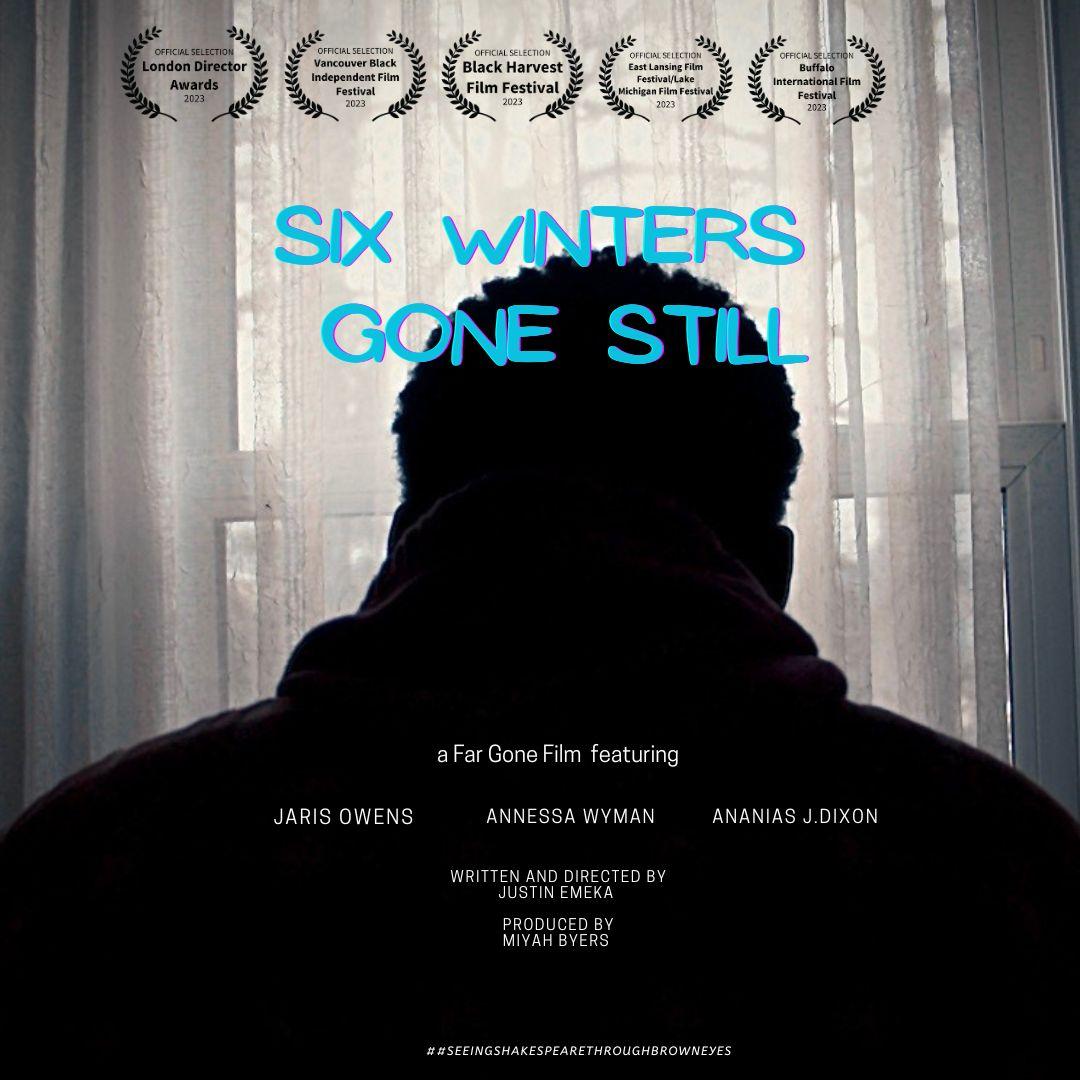“Six Winters Gone Still,” a short film written and directed by Associate Professor of Theater and Africana Studies Justin Emeka, OC ’95, has been recognized and awarded by film festivals across the world. The film, which was shot in Oberlin this past January, had no budget for its two-day shoot, and the cast and crew is made up mostly of students, alumni, and faculty.
“I made the film with some really talented students around me, and we just kind of made the film on impulse,” Emeka said. “The film takes place on the day a young Black man has to report [to] prison for six years. The film is about how a cousin/friend tries to prepare his mind to do the time.”
Inspired by William Shakespeare’s Richard II, the film was officially selected by five festivals, some of which include the Black Harvest Film Festival in Chicago, the Vancouver Black Independent Film Festival, and the London Director Awards.
“Applying into festivals has just been kind of an exercise; I had no idea that there were over ten thousand festivals a year,” Emeka said. “Who would have known? There’s just tons and tons of film festivals that you could apply to; I’m just kind of getting to know them, getting to know that world, getting to know that market, getting to know the art form, [and it] has been very exciting the past two years.”
College fourth-year Trey Scantlen, who worked as assistant cameraman on the short, enjoyed the community experience of shooting the film.
“It had that feeling where everybody was learning from each other, which was good,” Scantlen said. “It was one of the first crews I was on where I didn’t know everybody there. It definitely was inspiring, how much outreach the film has got. It’s done pretty well in its festival run, and it was inspiring to see that happen, especially with a professor coming from the theater background and jumping straight in. With that film in particular, out of all the crews I’ve been on, the Oberlin community just made it … more of a collective than just working for a class, just helping a classmate, so I think that was what I took out of it. It was a fun experience, I really enjoyed it.”
Emeka is currently in post-production for his second short, “Biological,” and planning a feature film, Rhythms in Raindrops. He is currently on a two-year sabbatical as he explores the world of film after decades working in theater.
“I had only directed in theater for 30 years,” Emeka said. “At the heart of [the film], it’s telling a story — that’s what I love about it. … And I’m excited about what I bring as a theater artist to TV and film, because I think my stuff is very much informed by years of theater sensibility.”
On stage, Emeka has worked for the past 20 years on adaptations of Shakespeare through the lens of contemporary Black life. His interest in these adaptations has carried over to film.
“One of the challenges for any modern director of Shakespeare is to contextualize it for an audience that’s getting it 450 years later,” Emeka said. “I am excited about what it can be in films, in terms of what I do specifically; reimagining the cultural aesthetic and cultural landscape of the world of the play. But essentially the same story, the same characters, the same emotions, just contextualized in a different way.”
Miyah Byers, OC ’20, served as both co-producer and co-director of photography for the film.
“I’ve worked with Justin on and off for six years,” Byers wrote in an email to the Review. “I’ve always known him to be an artful, thoughtful, and caring theater director with a deep respect and love for Black people and Black culture. In particular, Justin is masterful in blending Black culture with Shakespeare’s work, and he is incredibly skilled in working with actors. Under Justin’s direction, I’ve seen so many actors unlock themselves and find freedom in their roles in ways that make their acting so genuine. Justin brought his skill to this project in a way that shined on screen. The three actors, ranging from very little acting experience to years of acting experience, all delivered genuine performances under Justin’s direction. And the concept of the film itself is very creative and is one that I haven’t seen on screen before.”
Byers, who was a Cinema Studies major during her time at Oberlin, has worked with Emeka mostly in theater, and was excited to collaborate with him on film.
“All around, the film was an experiment and an opportunity for a small group of people to come together and make some art with limited resources, but with a lot of vision and talent,” she wrote. “In the moment, my hope was to do the best job I could do to bring Justin’s vision to life. This was actually the first fiction film I’ve ever worked on, so the entire process was a learning experience for me from start to finish. I learned a lot from pulling the team together, all the way down to managing the shoot days and passing the materials off to Justin and the post-production team. I’m proud to see that the hard work of a small team for a few weeks became a short film that has been so well received, and that it has made its way into some awesome festivals. That result is a testament to Justin’s vision and determination as a director, and of course to our amazing and dedicated actors and crew.”
Now that “Six Winters” is headed for festivals, Emeka reflects on the hope the short has inspired in him.
“‘Six Winters Gone Still’ taught me that I could make a film,” Emeka said. “It taught me everything about it; it helped me learn quickly how to talk to the people involved in film in a different artistic language and vocabulary. ‘Six Winters Gone Still’ is very dear.”














